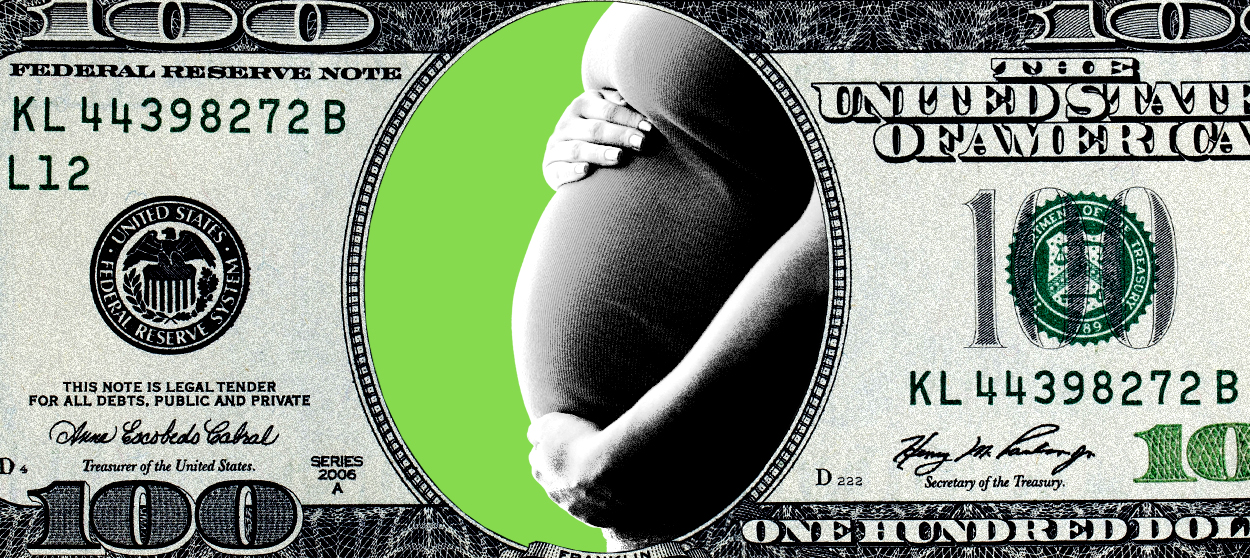Against commercial surrogacy
Why this conservative Catholic agrees with Gloria Steinem


A free daily email with the biggest news stories of the day – and the best features from TheWeek.com
You are now subscribed
Your newsletter sign-up was successful
As a conservative Catholic, I rarely find myself standing shoulder to shoulder with the likes of Gloria Steinem. Strange times make for strange bedfellows however, and Steinem won my admiration last week when she wrote an open letter opposing legislation that would legalize commercial surrogacy in the state of New York.
The bill has already passed New York's State Senate, but it encountered opposition in the Assembly, where some members have ethical concerns about the practice of paying women to be pregnant. "I find that commodification of women troubling," said Deborah Glick, who in 1991 became the first openly gay member of New York's legislature.
She's right. It is troubling. Commercial surrogacy exploits women, and treats children as market commodities. It shouldn't be legal in the state of New York, or anywhere else.
The Week
Escape your echo chamber. Get the facts behind the news, plus analysis from multiple perspectives.

Sign up for The Week's Free Newsletters
From our morning news briefing to a weekly Good News Newsletter, get the best of The Week delivered directly to your inbox.
From our morning news briefing to a weekly Good News Newsletter, get the best of The Week delivered directly to your inbox.
Here in the United States, New York is an outlier, as one of only three states that still bans commercial surrogacy outright. This irritates celebrities like Andy Cohen, who think it's "ridiculous" that they should be forced to travel to find an available womb. In Cohen's mind, gay men deserve the right to hire gestational carriers, without whom they may never experience the joy of cuddling their genetic offspring.
That inconvenience may seem preposterous to Cohen, but in fact, fertility tourism has been around for some time. With infertility and same-sex coupling both on the rise, so-called "intended parents" now regularly travel to Asia, Eastern Europe, or Mexico in search of legal and affordable gestational carriers. The ethical complications are obvious, and some nations that have experimented with commercial surrogacy eventually decided that it wasn't worth the money. Quite recently, India shut down its $400-million-per-year commercial surrogacy industry, which once gave rise to the famed Akanksha Infertility Clinic, where desperately poor Indian women bore children for affluent Westerners. As a business venture, this effort was wildly successful, but the Indians eventually decided that the practice was simply too exploitative. The French, British, Germans, Italians, Irish, Spanish, and Australians evidently agree. Most Western countries have in fact already banned commercial surrogacy. The United States now keeps company with Mexico, Nepal, and many former Soviet states, as countries where the wealthy can pay to have their children gestated in foreign wombs.
Instead of demanding an explanation for New York's restrictive surrogacy laws, we should probably be asking why other states are willing to tolerate a practice that most Western nations have deemed exploitative and demeaning to women.
Why is surrogacy demeaning? Advocates like to refer to the surrogate's service as "a selfless act," and put that way, it does sound pretty heartwarming. What kind of monster would stand in the way of these noble women, who willingly put their bodies on the line for the sake of others' family dreams?
A free daily email with the biggest news stories of the day – and the best features from TheWeek.com
This is completely disingenuous. Naturally, we tend to feel more comfortable with surrogacy if we picture the gestational carrier as a quasi-relative, beloved by the family and acting on the most generous of motives. Realistically though, commercial surrogacy is commercial. There's a difference between commerce and charity. If indeed a "selfless" New York woman had agreed to carry Cohen's baby, she could legally have done so under current laws. Evidently there were no volunteers, which is why he had to take his business to California, where "pre-birth orders" are available to secure a client's rights to the child he's commissioned.
Commercial surrogacy, in short, is not about selflessness. The people involved may be overflowing with kindness and love, or they may not. Either way, this is fundamentally a business transaction in which one party gets money, and the other, a baby.
This is not to say that either surrogates or their clients are bad people. Surrogates, for their part, are generally poor people. There's a reason you hear about celebrities hiring surrogates, not becoming them. When Adele jokes about acting as surrogate to a gay couple, we know she's not serious; what woman of means would do that? Advocates talk about "protections" for involved women, but realistically, the clients of the fertility industry are generally wealthy, while surrogates generally are not. They're there because they need the money.
Intended parents can be sympathetic figures too. All of us have friends or relatives who have experienced real anguish over their inability to have children. I myself struggled with infertility in the early years of my marriage, so I have deep sympathy for people enduring this trial. I've known many couples who tried to adopt and ended up heartbroken when the birth parents ultimately changed their minds. It's easy to understand why people would seek a path to parenthood that was more secure, and less emotionally fraught.
Nevertheless, there are reasons why the law affords so many protections to natural parents. A mother's relationship with her child doesn't begin with that first mewling cry. By the time she sees her baby face to face, the mother has already been aware of his or her presence for many months. The connection mother and child share is not simply generic. Every pregnancy is different, just as every child is different. Thinking back on my own five babies, I can remember which were constantly moving in utero, which were mellower, which startled easily, and which seemed more or less unflappable. Years later, they have those same personalities. I tell my kids today about the things we did together when we were literally joined at the hip (or rather, the umbilical cord). One of my sons tagged along with me to stressful job interviews; another was the only family member present when I received a journalism award. Seven weeks before my second son's birth, I could feel him doing his morning calisthenics as we walked across the Cornell University campus for my dissertation defense. "Let's do this, baby," I whispered as we entered the building.
Pregnancy is not a preliminary to motherhood. It is a stage of motherhood. Sometimes it's truly necessary, for everyone's well-being, to entrust the next stage to someone else. But a child's first meaningful human relationship is with the woman who carries them, and brings them into the world. That relationship should not be contracted out to a stranger.
As Americans today are just coming to understand, we have long been too tolerant of the objectification of the female body. We see this concern echoed in the #metoo movement, in the debate over abortion and pornography, and in discussions of sexual assault on college campuses. The female body is both beautiful and remarkable in many ways. But women are people, not just vessels of flesh. If we truly want to make this understood, we should stop permitting the wealthy to rent the wombs of the poor. Gloria Steinem has said so. This conservative Catholic agrees.
Rachel Lu is a writer based in Roseville, Minnesota. Her work has appeared in many publications, including National Review, The American Conservative, America Magazine, and The Federalist. She previously worked as an academic philosopher, and is a Robert Novak Journalism Fellow.
-
 Political cartoons for February 15
Political cartoons for February 15Cartoons Sunday's political cartoons include political ventriloquism, Europe in the middle, and more
-
 The broken water companies failing England and Wales
The broken water companies failing England and WalesExplainer With rising bills, deteriorating river health and a lack of investment, regulators face an uphill battle to stabilise the industry
-
 A thrilling foodie city in northern Japan
A thrilling foodie city in northern JapanThe Week Recommends The food scene here is ‘unspoilt’ and ‘fun’
-
 The billionaires’ wealth tax: a catastrophe for California?
The billionaires’ wealth tax: a catastrophe for California?Talking Point Peter Thiel and Larry Page preparing to change state residency
-
 Bari Weiss’ ‘60 Minutes’ scandal is about more than one report
Bari Weiss’ ‘60 Minutes’ scandal is about more than one reportIN THE SPOTLIGHT By blocking an approved segment on a controversial prison holding US deportees in El Salvador, the editor-in-chief of CBS News has become the main story
-
 Has Zohran Mamdani shown the Democrats how to win again?
Has Zohran Mamdani shown the Democrats how to win again?Today’s Big Question New York City mayoral election touted as victory for left-wing populists but moderate centrist wins elsewhere present more complex path for Democratic Party
-
 Millions turn out for anti-Trump ‘No Kings’ rallies
Millions turn out for anti-Trump ‘No Kings’ ralliesSpeed Read An estimated 7 million people participated, 2 million more than at the first ‘No Kings’ protest in June
-
 Ghislaine Maxwell: angling for a Trump pardon
Ghislaine Maxwell: angling for a Trump pardonTalking Point Convicted sex trafficker's testimony could shed new light on president's links to Jeffrey Epstein
-
 The last words and final moments of 40 presidents
The last words and final moments of 40 presidentsThe Explainer Some are eloquent quotes worthy of the holders of the highest office in the nation, and others... aren't
-
 The JFK files: the truth at last?
The JFK files: the truth at last?In The Spotlight More than 64,000 previously classified documents relating the 1963 assassination of John F. Kennedy have been released by the Trump administration
-
 'Seriously, not literally': how should the world take Donald Trump?
'Seriously, not literally': how should the world take Donald Trump?Today's big question White House rhetoric and reality look likely to become increasingly blurred
